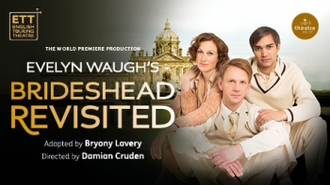Review: Brideshead Revisited at the Richmond Theatre

'Sebastian [Flyte] has such charm', Anthony Blanche warns Charles Ryder in Evelyn Waugh's Brideshead Revisited: 'It kills love; it kills art; I greatly fear, my dear Charles, that it has killed you.' And, of course, it is not just Sebastian - the charming homosexual sot who descends into melancholic alcoholism - who charms Charles; it is, in effect, the whole Marchmain (Flyte) family: Old Catholic, aristocratic, and not forgetting their beautiful ancestral pile, Marchmain House. Lord Marchmain, the last aristo to be hounded out of England, has decamped to Venice where he lives in decaying splendour with his glamorous mistress Cara. The saintly 'wronged wife' Lady Marchmain is left in charge of the house and family.
In this beautiful, flowing adaptation of Waugh's great part-autobiographical novel by Bryony Lavery, the focus is almost entirely on Charles's encounters with the family and those intimately associated with them. Hilarious scenes such as the Oxonians' foray into London clubland and Sebastian's subsequent drunk-driving disgrace, and contextual markers such as Charles's reactionary politics during the 1926 General Strike are sadly missing - there is only so much one can fit in in the roughly two hours traffic of this sensitively directed production by Damian Cruden.
Nevertheless, a multi-roling cast succeed in evoking the charm and elegance of Waugh's Brideshead world - the period ambience of which is also consummately evoked by the elegant, strongly lit and richly coloured designs of Sara Perks (designer) and Richard G Jones (lighting design). A recurrence of empty frames and transparent screens into which the beau monde stare recalls Baldassare Castiglione's Book of the Courtier where courtiers 'frame' themselves for courtly p.r. purposes - suggesting a possible fragility and vanity to mere surface appearances, not to mention the dangers of deception and duplicity.
Waugh was a great snob with the saving grace of a brilliant sense of wit and humour. This talented cast do this full justice when opportunity allows. Waugh also had a great cultural grasp and sensitivity - an impressionist's ability to evoke a milieu or scene with just the odd dash of colour: for example, references to Max Reinhardt, or Vittoria Corombona as a society hostess (a sly reference to the tragic heroine of Webster's Jacobean tragedy, The White Devil). Shuna Snow was able to go to town with her delightfully caricatured interpretations of pious prig Bridey Flyte and thrusting Canadian sociopath Rex Mottram. Her nimble exchange of garments from one to t'other at one moment on stage, coupled with a neo-Expressionist element in her interpretations, foregrounded a persistent sense of Ryder negotiating a world of glamorous but fictitious theatricality - caught up in his own 'Flyte of Fancy'.
Given these fascinating and entirely successful interpretations, I lamented that Nick Blakeley's Anthony Blanche bore precious little of the flamboyance and exoticism that makes him such a joy in the novel. (And alas, no room here for his anecdote of a forced bath in Mercury fountain at the hands of the Bullingdon Club.) Nevertheless, Blakeley did bring a flowing ease and an outsider's perspicacity to the part. He it is who is able to adjudge that Ryder the artist, in succumbing to charm - for which read a class-based appeal - has lost his sense of truth.
Charles embarks upon an adulterous love affair with Sebastian's sister, Julia. Cue the infamous words of Ryder: 'It was as though a deed of conveyance of her narrow loins had been drawn and sealed. I was making my first entry as the freeholder of a property I would enjoy and develop at leisure.' Their giddying coming together aboard a luxury liner during a storm was played out on conjoined but opposite facing chairs on wheels, propelled around the stage on a long rope manipulated by two other cast-members - which made me think of medieval vices at play.
After Lady Marchmain's untimely death, Lord Marchmain returns to his ancestral home to die. In a hugely moving and climactic scene, Paul Shelley played the frail patriarch's final moments in a great bed centre-stage with a beautifully observed simplicity. A struggle ensues over whether the Catholic refusenik lord should receive the last rites. Charles the atheist is set against but is outvoted by Clara and Julia.
The dying man is anointed. Shelley emitted heartfelt sighs and then, with a great will, struggled to make a sign of the cross in his agony. The novel and the production made clear that in the sacrament he was given the assurance of God's grace.
As in much great drama (and novels), here was a crucial rite of passage, and I was suddenly reminded forcibly of Everyman's end:
Into thy hands, Lord, my soul I commend;
Receive it, Lord, that it be not lost.
...
In manus tuas, of mights most
For ever, commendo spiritum meum.
[He sinks into his grave]
The simplicity and the gestural acting were also all of a piece with Everyman.
In this their final week on tour, the cast should correct a few faulty pronunciations - 'Francis Xavier', 'Breviary', 'a' pronounced as 'ay' on a few occasions. I also don't see the need for them to be mic'd up, particularly when at one or two moments they made inspired use of period microphones on stage. It was regrettable to see the microphone wires so visibly.
But, thanks to Lord Marchmain's climactic death-scene, this beautiful production succeeds in revealing what lies beyond the charm - the beauty of compassion and grace - and this is what Charles gleans in the end.
Playing this week at Richmond Theatre, Surrey.
For more details see: www.atgtickets.com/venues/richmond-theatre/
Dr Philip Crispin is a lecturer in Drama at the University of Hull















